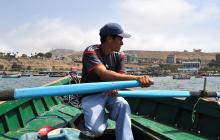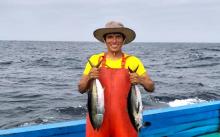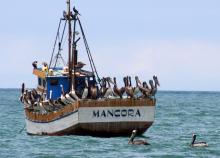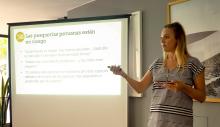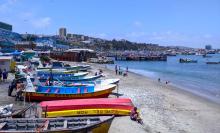Peru
Pedro is a fisher from Chorrillos, a coastal area on the Southern outskirts of Lima in Peru. For Pedro, fishing is a lifestyle: his dad taught him how to fish at age 13, and he started fishing with his uncles at age 14, almost thirty years ago. He has made his living from the ocean ever since. Fishing for swordfish, mahi mahi, and other species up to one hundred miles from the coast, Pedro is intimately familiar with the ocean and ports across Lima Municipality.
Tags
(Versión en Español más abajo)
As part of Future or Fish’s response to COVID-19 in Peru, two things became clear: mobility restrictions were severely hindering logistics, and demand had dropped significantly. In a matter of weeks, COVID-19 had changed the way people access and consume seafood in Peru — a pattern experienced by seafood supply chains globally.
Tags
Fishers are essential workers, but what happens when they don’t have the gear they need to work safely in a pandemic? This week, Future of Fish launches a new campaign in partnership with fishers from La Islilla, Peru, to provide personal protective equipment (PPE) to the fishers and seafood workers who need it most.
Tags
Ever since she was a little girl, Patricia Purizaca accompanied her mother to work at the Máncora pier. Two years ago, when her mother got sick, Patricia decided to leave her job in the district municipality and start her own business, a small restaurant stand on the dock by that very same pier. This is where she greets fishermen returning from their long work at sea, fish handlers, and the occasional tourist who is interested in the reality of the people who make their living from the ocean.
Tags
Abril 30, 2020
Durante una pandemia mundial, ¿qué sucede con los pescadores de mundo? Esta semana, el ONG Future of Fish anunció sus planes para apoyar a los pescadores y a las comunidades pesqueras en este momento sin precedente. La propagación y los efectos devastadores de la pandemia COVID-19 han paralizado un gran parte del mundo. Pero los peces siguen nadando como de costumbre, y los pescadores a menor escala de todo el mundo siguen dependiendo de los océanos para su sustento, y la seguridad alimentaria de sus comunidades. Pero los pescadores están en aprietos, dado que miles de millones de personas están confinadas en sus casas, la economía mundial está en crisis, las cadenas de suministro se han interrumpido, y ya no pueden vender o distribuir su pescado como de costumbre.
Tags
During a global pandemic, what happens to the world’s fishermen? This week, nonprofit Future of Fish announced its plans for supporting fishers and fishing communities in this unprecedented time.
The spread and devastating effects of the COVID-19 pandemic has brought much of the world to a standstill. But fish are still swimming as usual, and small-scale fishers around the globe still depend on the oceans for their livelihood, and their communities’ food security.
Tags
No one person or organization can change a system. Improving seafood sourcing, shifting supply chains, and strengthening small-scale fisheries all require massive and long-term efforts from multiple stakeholders and passionate advocates. Still, every system has intervention points or key levers that can help accelerate change. As we try to build a movement for responsible seafood sourcing in Peru, we’ve identified chefs as powerful levers for driving the movement.
Tags
16 de marzo de 2020
Para publicación inmediata
Future of Fish y el World Wildlife Fund (WWF) se complacen en formalizar una nueva colaboración diseñada para promover la sostenibilidad en el Proyecto de Mejora Pesquera (FIP, por sus siglas en inglés) del perico peruano. Este trabajo reúne el innovador Modelo de Desarrollo de Pesquerías (FDM, en inglés) de Future of Fish, el cual integra incentivos económicos y sociales a las mejoras ambientales, y las décadas de experiencia y relaciones de WWF en el contexto de mejora de pesquerías.
Tags
March 16, 2020
For Immediate Release
Future of Fish and World Wildlife Fund (WWF) are excited to formalize a new collaboration designed to advance sustainability in the Peruvian mahi mahi fishery improvement project (FIP). The work brings together Future of Fish’s innovative Fishery Development Model (FDM), which integrates economic and social incentives along with environmental improvements, with WWF’s decades of experience and relationships in the fishery improvement space.
Tags
Billions of people depend on fish as a critical source of protein. From lobster divers in Belize to handline mahi-mahi fishers in Peru, communities around the world feed themselves and make a living from the fish they pull from the ocean every day. But these livelihoods are under threat. Climate change is already wrecking havoc for coastal communities in developing countries, with rising seas damaging dockside infrastructure and warming waters driving away traditional fish stocks. The result is loss of income, food, and in many cases, cultural heritage.
Tags
Pages


